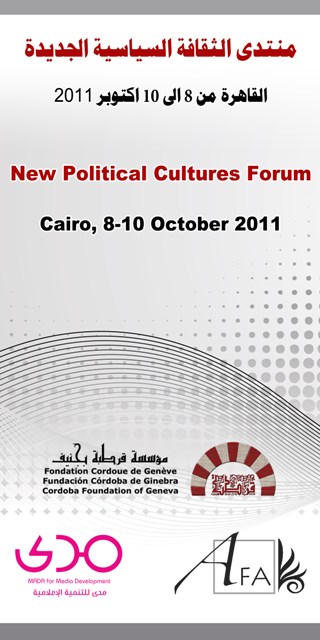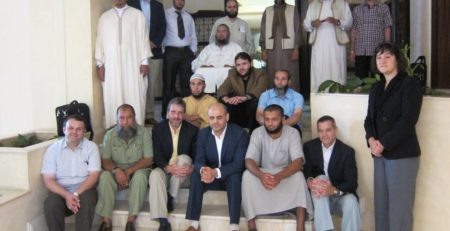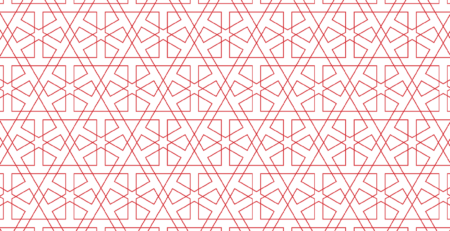Forum on New Political Cultures in North Africa and the Middle East, First Edition, 2011

The Forum on New Political Cultures in North Africa and Middle East was held in Cairo on October 8-10, organized by the Cordoba Foundation of Geneva in partnership with MADA for Media and the Arab Forum for Alternatives. It convened some 60 activists, researchers, bloggers and actors of mobilizations from several North Africa and Middle East (MENA) countries: Morocco, Tunisia, Libya, Egypt, Yemen, Syria and Bahrein. The objective of this event was to develop together a better understanding of the new political cultures and the values they illustrate (equality, freedom, justice, dignity, inclusiveness, non-violence, non ideological and participatory approach, etc.), It also aimed to explore the similarities and differences in the expressions of political change between countries and to look into the waning of the rhythm of change. The forum offered a unique opportunity to share concrete experiences, to develop shared analyses of the recent changes, and to plan initiatives in the field of conflict resolution and peaceful change. Through discussions at the academic and practical levels, it enabled participants to move towards a focus on shared experiences: What rules of collective political action are we promoting? How can we defend the respect of our shared principles on the ground?
Participants to the forum had diverse and very rich experience backgrounds, often combining profiles of activist, blogger, political actor and/or researcher. They configured a very inclusive spectrum of ideological and political background (ranging from secular to Islamists, revolutionary to reformist and more conservative), gender and age (youth and more senior profiles). The selection of participants had been made possible thanks to Cordoba Now’s Network of experts, whose members had reached out throughout the region to achieve a fairly representative segment of the region’s diverse civil society (albeit without the ambition of achieving a formal representativity). This balanced participation enabled constructive discussions where participants explored ways to prevent/mitigate violent crises and support peaceful and inclusive dynamics in the current processes of change.
The Forum on New Political Cultures in North Africa and Middle East gathered an inclusive political and ideological spectrum of actors of mobilizations from six countries concerned by the so-called “Arab Spring”. Participants shared experiences about the recent changes in the region and assessed the commonalities in values. They discussed and planned transversal cooperation initiatives to defend the respect of shared principles on the ground, to prevent or mitigate backlashes and to promote rules of collective political action. This summary highlights some of the main points raised by the participants.
• The dynamics of political change in the MENA region cannot be taken for granted and their outcomes are not fully predictable. Despite this, the recent protest mobilizations do give evidence of a deep change in political cultures, with new forms of engagement in collective and political action, a profound questioning of the relationship to power, and new articulations between individual and collective identities through the emergence of ‘individual citizenship’.
• The popular dynamics manifest a set of “universal humanist values”: political freedom, citizenship, national/popular determination, inclusiveness, dignity, equality, justice, along with transition-born aspirations such as security and stability.
• These political cultures have materialized new forms of political engagement from actors that were previously less visible in the political scene (e.g. youth, women, periphery area groups, salafi leaders). It is a challenge to integrate the mobilization activists in the formal political sphere (including youth that challenged their parties’ internal organization or are not keen on political participation within the scope of political parties), because many tend towards mistrust and disengagement vis-à-vis the traditional political sphere. This risks reproducing former models of central elite governance.
• Non-violence has not so much been an absolute principle than conditioned by the specific structure of political opportunities of each mobilization. Nevertheless, its moral and ethical value remains essential, and violent action should never be ensconced as a mode of political action.
• The protest mobilizations have created opportunities to build new political solidarities, focusing on consensual claims and enabling to fend off sectarian policies of contested regimes. The ‘insurrectional moments’ have thus served as learning processes on consensual and citizen governance of pluralism, where political actors have shown to be more willing to adjust their discourse than in victorious occurrences.
• Mobilizations have witnessed a renewed strength of regional solidarity with no identity tensions against the “Western world”. Nevertheless, Western governments are challenged on their own coherence vis-à-vis the principles they promote for the region and on double standards. External interference, both Western and regional (Arab-led), is not rejected outright and can be acknowledged as a factor that has rescued from blocked bloodshed situations.
• A crucial present stake is to provide the supporting structure to institutionalize the values of the mobilizations. Evolving from insurrectional mobilizations to political competition is a hazardous step, when solidarities built in the street must be preserved in the transition, and consensus must be nurtured in a political pragmatic approach. In phases of transition and reconstruction, finding a ‘negative consensus’, i.e. “what we agree to reject” can be more feasible than agreeing on a definition of “what we want”.
• It is imperative for societies to build bulwarks against authoritarianism. This implies to create instruments to establish an authentic balance of political powers, most probably outside of the usual institutionalized political field. The civil society has a fundamental role in consolidating the emergence of the new political generation, in helping institutionalize the rules of political and collective action, and act as whistle blowers in cases of infringement to this ‘code of conduct’. The planned Observatory project in Egypt could possibly implemented with a regional dimension
• There are real concerns about the growing forces of inertia and backtrack that threaten the dynamics of change. These ‘counter-revolution’ dynamics are often carried by the permanence of the “deep state” and the trail of the contested regimes, as is seen with the symptomatic convergence between some new political elites and deep state. The recourse to identity polemics and the affirmation of competing particularisms also reactivate the same old divisive practices, as for instance in unsubstantial debates on the relation between religion and state or in reactivation of regional, tribal and/or ethnic tensions.
• Pursuing exchanges and repeating the experience of the forum can be useful to go more in depth into specific issues and work together to bring practical responses to present challenges. Many projects for transversal cooperation have been explored to further develop the forum’s potential outcomes, starting with a platform for regular exchange and sharing ideas. Beyond that, participants agreed that cooperation will help to address shortcomings of traditional and new media and raise awareness about “under-covered” mobilizations to other Arab countries and to the “international community”. Horizontal synergies between Arab countries can also be very beneficial to assess opportunities and risks of integration of political and civil society actors with the international community, and to build informed strategies for meaningful international partnerships. Several principles in engaging with foreign support can help to distinguish between real and perceived hazards of manipulation and undermining sovereignty, such as independence vis-à-vis governments and rejection of selective political support.
• Other practical suggestions were made, among which: developing the concept of citizenship initiatives to address strategies of discord and fragmentation; monitoring of forces of inertia, backtrack and ‘counter-revolution’; research on “youth politics and on South-South and South-North relations between civil society; pilot experiments on transversal cooperation; networks of revolutionary women; and strategic plans for raising awareness and influence.
تقرير حول منتدى” الثقافات السياسية الجديدة في شمال أفريقيا والشرق الأوسط”
مـــــــدخـــــــــل
عقد منتدى الثقافات السياسية الجديدة في شمال أفريقيا والشرق الأوسط بالقاهرة أيام 08-10 أكتوبر، بتنظيم من مؤسسة قرطبة بجنيف في شراكة مع مؤسسة مدى للإعلام والمنتدى العربي للبدائل. شارك في هذا المنتدى نحو 60 ناشطا وباحثا ومدونا وفاعلا في الحراك السياسي الأخير الذي عرفته عدة بلدان من شمال أفريقيا والشرق الأوسط : المغرب ، تونس ، ليبيا ، مصر، اليمن، البحرين وسوريا. وكان الهدف من هذا الحدث هو تطوير فهم مشترك أفضل للثقافات السياسية الجديدة والقيم التي عبرت حركات الاحتجاج الجماهيري (المساواة، الحرية، العدالة، الكرامة، الانفتاح على الجميع، نهج سلمي/غير عنيف و مقاربة تشاركية و غير ايديولوجية، الخ) ، كما تهدف إلى استكشاف أوجه التشابه والاختلاف في أوجه التغيير السياسي بين البلدان والنظر في مسار و وتيرة التغيير. كان المنتدى فرصة فريدة لتبادل الخبرات الملموسة و تطوير التحليلات المشتركة حول التغيرات الأخيرة، والتخطيط لمبادرات في مجال حل النزاعات والتغيير السلمي. من خلال المناقشات على الصعيدين الأكاديمي والعملي، اتجه المشاركون نحو التركيز على تبادل الخبرات و طرح الأسئلة: ما هي قواعد العمل السياسي الجماعي التي ينبغي تعميمها؟ كيف يمكننا الدفاع عن احترام مبادئنا المشتركة على أرض الواقع؟
وكان المشاركون في المنتدى من خلفيات متنوعة وتجارب غنية جدا، و يجمع أغلبهم بين أكثر من مجال: النشاط النضالي، التدوين الإلكتروني، العمل السياسي أو البحث العلمي. نوعية المشاركة كانت شاملة لخلفيات ايديولوجية وسياسية مختلفة (من العلمانيين والإسلاميين، من الثوريين و الاصلاحيين و الأكثر محافظة)، و من الجنسين و فئات عمرية مختلفة (شباب ومن متقدمين في السن). اختيار المشاركين تم باقتراح من أعضاء شبكة “قرطبة الآن”، وهم خبراء من جميع أنحاء المنطقة، من أجل تحقيق أمثل لأطياف متنوعة من المجتمع المدني في المنطقة ( دون البحث عن تمثيل رسمي). مكن هذا التوزيع المتوازن للمشاركين من نقاشات بناءة و استكشاف سبل لمنع / تخفيف الأزمات العنيفة ودعم ديناميكية سلمية وشاملة في مسارات التغيير الحالية.
مــــــلـــــخــــص تـــنـــفــيـــذي
جمع منتدى الثقافات السياسية الجديدة في شمال أفريقيا والشرق الأوسط أطيافا سياسية وإيديولوجية مختلفة من خلال مشاركة عناصر فاعلة في ديناميكية ما يسمى “الربيع العربي” من ست دول. تبادل المشاركون الخبرات حول التغيرات الأخيرة في المنطقة و رؤيتهم للقيم المشتركة. وتم النقاش والتخطيط لمبادرات التعاون للدفاع عن احترام المبادئ المشتركة على أرض الواقع، لمنع أو التخفيف من الانتكاسات المحتملة، وتعزيز قواعد العمل السياسي الجماعي. يلقي هذا الملخص الضوء على بعض النقاط الرئيسية التي أثارها المشاركون.
• ديناميكيات التغيير السياسي في منطقة الشرق الأوسط ليست مكسبا مفروغا منه، ونتائجها لا يمكن التنبؤ بها تماما. على الرغم من هذا، فحركات الحشد و الاحتجاج الاخيرة تعطي دليلا على وجود تغيير عميق في الثقافة السياسية، مع وجود أنماط جديدة من المشاركة في العمل العام والسياسي، ووضع علاقات السلطة في موضع المساءلة و النقد، والتفاعلات الجديدة بين الهويات الفردية والجماعية من خلال ظهور “مواطنة فردانية”.
• التحرك الشعبي أصبح يعبر عن مجموعة من “القيم الإنسية الكونية”: الحرية السياسية، المواطنة، حق التقرير وطني / شعبي، الانفتاح على الجميع، الكرامة، المساواة، العدالة، جنبا إلى جنب مع تطلعات برزت مع المرحلة الانتقالية مثل الأمن والاستقرار.
• تجسدت هذه الثقافات السياسية في أشكال جديدة من المشاركة السياسية تبناها فاعلون كان حضورهم أقل وضوحا في المشهد السياسي السابق (مثل الشباب والنساء، والفئات المنتمية للمناطق الهامشية، ورموز السلفية). إن إدماج هؤلاء النشطاء الجدد في المجال السياسي المؤسساتي (بما في ذلك الشباب الذين ينتقدون منظماتهم الحزبية من الداخل أو لا يحبذون المشاركة السياسية في نطاق الأحزاب) يعتبر تحديا كبيرا، وذلك لأن لديهم كثيرا من الريبة ويميلون إلى العزوف عن المجال السياسي التقليدي. هذه أحد المخاوف من إعادة إنتاج النموذج السابق لحكم نخبوي مركزي.
• عدم اللجوء إلى العنف ليس مبدأ مطلقا بل هو مشروط بالإمكانيات السياسية المتاحة لكل حركية احتجاجية. ومع ذلك، فميزة السلمية الأخلاقية والمعنوية أساسية، وينبغي أن لا يتحول أبدا الفعل العنيف إلى نمط للسلوك و العمل السياسيين.
• خلق الحشد الاحتجاجي فرصا لبناء علاقات تضامنية سياسية جديدة، من خلال التركيز على المطالب التوافقية وتجاوز السياسات الطائفية للأنظمة المفتقرة للشرعية. “زمن التمرد و الاحتجاج” قد يكون مفيدا في عملية اكتساب و تبني حكامة مواطنة و توافقية، لأن الفاعلين السياسيين يكونون أكثر استعدادا لضبط و مساءلة خطابهم في هذا الزمن أكثر من لحظات “زمن الانتصار”.
• شهدت حركيات الحشد عودة جديدة قوية للتضامن بين شعوب المنطقة مع عدم وجود توترات هوياتية موجهة ضد “العالم الغربي”. ومع ذلك، تواجه الحكومات الغربية انتقادات لازدواجية المعايير التي تتباها في المنطقة. لم يتم رفض أي تدخل خارجي بشكل كلي، سواء الغربية والإقليمية (التي يقودها العرب)، ويمكن الاعتراف بأنه كان كأحد الوسائل التي انقذت في حالات متأزمة للعنف الدموي.
• كان رهان الحاضرين في المنتدى هو توفير بنية داعمة لترسيخ قيم الحراك السياسي الأخير في المنطقة. المرور من سياق الحشد و التعبئة الاحتجاجية إلى سياق التنافس السياسي هو خطوة خطرة، لهذا يجب الحفاظ على العلاقة التضامنية التي بنيت في الشارع خلال الفترة الانتقالية، ويجب أن تنمو وتتشكل الآراء وفق مقاربة سياسية إجرائية. في المراحل الانتقالية وإعادة البناء، إيجاد “توافق بالسلب”، أي “الاتفاق على ما لا نريد” يمكن أن يكون أكثر جدوى من الاتفاق على تعريف “ما نريد”.
• من أجل أن تحصن المجتمعات نفسها ضد الاستبداد تحتاج إلى خلق الأدوات اللازمة لإقامة توازن حقيقي بين السلطات السياسية، وربما أكثر خارج الحقل السياسي المؤسسي المعتاد. للمجتمع المدني دور أساسي في تعزيز بروز جيل سياسي جديد، في المساعدة على ترسيخ قواعد العمل السياسي والعام، ويقوم المجتمع المدني بدور المراقب في حالات التعدي على “مدونة السلوك السياسي”. يمكن لمشروع المرصد المزمع أنشاؤه في مصر أن يتم توسيعه ليكون له بعد إقليمي.
• هناك مخاوف حقيقية من قوى مناهضة التغيير. وكثيرا ما تأتي هذه الديناميكيات “المضادة للثورة” من رواسب “الدولة العميقة” التي خلفتها العديد من الأنظمة السابقة وراءها، كما قد يحصل تماهي بين بعض النخب السياسية الجديدة والدولة العميقة. العزف على وتر الهوية و التترس وراء الخصوصيات هو إعادة توظيف للممارسات القديمة التي تدفع للتجزئة و الانقسام، كما يحدث على سبيل المثال في الجدل حول العلاقة بين الدين والدولة أو في تنشيط التوترات الاقليمية والقبلية و / أو العرقية.
• يمكن مواصلة تبادل الخبرات من خلال إعادة تجربة المنتدى للتعمق اكثر في قضايا محددة، والعمل معا لإيجاد أجوبة عملية للتحديات. تم استكشاف العديد من مشاريع التعاون البينية لمواصلة تطوير النتائج المتوقعة للمنتدى، بدءا من أرضية دائمة لتبادل الأفكار وتقاسم التجارب. إضافة إلى ذلك، اتفق المشاركون على أن التعاون سيساعد على معالجة أوجه القصور في وسائل الاعلام التقليدية والجديدة في التحسيس وتغطية الحركات الاحتجاجية في الدول العربية الأخرى و”المجتمع الدولي”. يمكن للتعاون الأفقي بين الدول العربية أيضا أن يكون مفيدا جدا لتقييم الفرص والمخاطر الناجمة عن التفاعل بين الجهات الفاعلة في المجتمع السياسي والمدني مع المجتمع الدولي، وبناء استراتيجيات مستنيرة من أجل شراكات دولية حقيقية. وضع مجموعة من المبادئ في التعامل مع الدعم الخارجي يساعد على التمييز بين المحاذير الحقيقية والمتصورة للتلاعب وتقويض السيادة، مثل الاستقلالية عن الحكومات، ورفض الدعم السياسي الانتقائي.
• تم الإدلاء باقتراحات عملية أخرى، من بينها : تطوير مفهوم المبادرات المواطنة للتصدي لاستراتيجيات الفتنة والتفتيت، ورصد اتجاهات مناهضة التغيير، وعودة “الثورة المضادة”، وإجراء بحث عن “الشباب والسياسة” و العلاقات بين المجتمع المدني فيما بين بلدان الجنوب و بين الشمال والجنوب؛ تعميم التجارب الرائدة للتعاون الأفقي، وعملية تشبيك بين النساء الثوريات، و وضع خطط استراتيجية للرفع من الوعي والتأثير.











